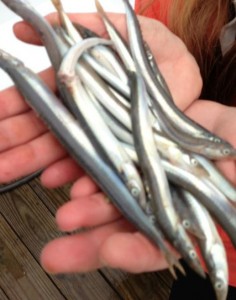In case you are wondering why this is important. With heavier regulations on catch totals, there are people within the industry that may look to start harvesting forage species that are unregulated for fish meal and oil, in fact some are already considering this option. By regulating these species now, we can protect them for the future. Also with reductions in catches such as flounder and striped bass, once those stocks start to bounce back they will need food, and if that food source is depleted by harvesting, these and other fish will starve or suffer from disease. Striped bass are already having disease issues with the lack of bunker or menhaden in our waters. If you can not attend any of these meetings please send emails, written letters or faxes to the addresses listed at the end of the press release. It would be better to have regulations in place now before someone in the commercial industry starts to look at unmanaged forage species for a source of income. Can you imagine the damage to the sand eel population if they were harvested the way herring and menhaden already are or were back in the day, especially unchecked or regulated. The kill em all we need a paycheck mentality could do some serious damage to the forage fish.
Below is the press release from the MidAtlantic Marine Fishery Management Council …
MidAtlantic Marine Fishery Managment Council to Hold Scoping Hearings for Action on Unmanaged Forage Species

The Mid-Atlantic Fishery Management Council has scheduled a series of scoping hearings to gather public input for a proposed action to protect unmanaged forage species. The proposed action would consider a prohibition on the development of new, or expansion of existing, directed fisheries on unmanaged forage species in the Mid-Atlantic until adequate scientific information is available to promote ecosystem sustainability. Eight hearings will be held between September 15, 2015 and October 1, 2015 in locations throughout the Mid-Atlantic region. Written comments may also be submitted through October 2, 2015.
Forage species are small, low trophic level fish and invertebrates that play an important role in sustaining the productivity and structure of marine ecosystems. Many forage species in the Mid-Atlantic are not currently subject to significant directed fishing, but increasing global demand for fishmeal, fish oil, and bait could encourage the development of new fisheries for these species. With this action, the Mid-Atlantic Council is taking a proactive approach to conserving unmanaged forage species and the ecosystem services they provide.
The Council has not yet decided which forage species will be addressed by this action; however, this action will only address species that are not currently managed by the Mid-Atlantic, New England, or South Atlantic Fishery Management Councils, or by the Atlantic States Marine Fisheries Commission.
Scoping Process
Scoping is the process of identifying issues, potential impacts, and a reasonable range of alternatives associated with a management action being developed by the Council. Scoping is the first and best opportunity for the public to make suggestions and raise concerns about new Council actions. Comments may be submitted in-person during the hearings listed below or in writing.
Additional information and updates about this action can be found in the scoping document and on the Unmanaged Forage Action page of the council’s website.
Scoping Hearing Schedule
Tuesday September 15, 2015. 6:30–8:30 pm. — North Carolina Department of Marine Fisheries Washington Regional Office Hearing Room. Washington Square Mall, 943 Washington Street, Washington, NC, 27889. Telephone: 252-946-6481.
Wednesday September 16, 2015. 6:00–8:00 pm. — Virginia Marine Resources Commission 4th Floor Meeting Room. 2600 Washington Avenue, Newport News, VA, 23607. Telephone: 757-247-2200.
Thursday September 17, 2015. 6:30–8:30 pm. — Congress Hall Hotel. 200 Congress Place, Cape May, NJ, 08094. Telephone: 844-264-5030.
Monday September 21, 2015. 6:30–8:30 pm. — Kingsborough Community College Building T-3. 2001 Oriental Boulevard, Brooklyn, NY, 11235. Telephone: 718-368-5000.
Monday September 28, 2015. 6:30 pm – 8:30 pm. — University of Rhode Island Bay Campus Corless Auditorium. 215 South Ferry Road, Narragansett, RI, 02882. Telephone: 401-874-6222. (Directions)
Tuesday September 29, 2015. 6:30–8:30 pm. — New York Department of Environmental Conservation Bureau of Marine Resources Hearing Room. 205 North Belle Mead Road, Suite 1, East Setauket, NY, 11733. Telephone: 631-444-0430.
Wednesday September 30, 2015. 6:30 pm – 8:30 pm. — Worcester County Library Ocean Pines Branch Meeting Room. 11107 Cathell Road, Berlin, MD, 21811. Telephone: 410-208-4014.
Thursday October 1, 2015. 6:30–8:30 pm. — Webinar. Information on how to connect to the webinar will be available on the events page of the Council website: www.mafmc.org/council-events/. There will be an audio only option which will require a phone connection.
These meetings are physically accessible to people with disabilities. Requests for sign language interpretation or other auxiliary aid should be directed to M. Jan Saunders, 302-526-5251, at least 5 days prior to the meeting date.
Written Comments
The Council will also accept written comments through 11:59 pm on Friday October 2, 2015. Written comments may be sent through any of the following methods:
Online at www.mafmc.org/comments/unmanaged-forage
Mailed to: Dr. Chris Moore, Executive Director, Mid-Atlantic Fishery Management Council, 800 North State Street, Suite 201, Dover, DE, 19901. (Please write “unmanaged forage scoping comments” on the outside of the envelope.)
Emailed to: Julia Beaty, Assistant Fishery Plan Coordinator, at jbeaty@mafmc.org. (Please write “unmanaged forage scoping comments” in the subject line.)
Faxed to: Dr. Chris Moore, Executive Director, Mid-Atlantic Fishery Management Council at fax number 302-674-5399. (Please write “unmanaged forage scoping comments” in the subject line.)



Comments are closed.